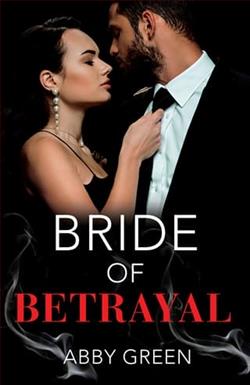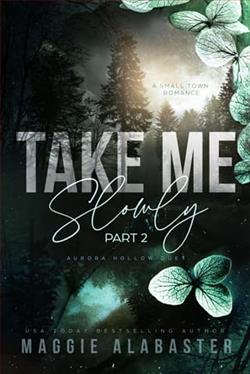Page 22 of Our Last Vineyard Summer
“My mommy is right down the way,” the child said, taking her bike and pointing it in the opposite direction. “We’re here from Nantucket. We live there.”
Everyone held their breath as they watched her pedal away. Count to five. Breathe in, breathe out. At some point, Betsy had taken her hand, their palms pressing together.
Virgie had seen the oddest thing in that girl.
Charlie always said you could see someone’s entire life in their eyes. At the dinner table, he liked to repeat a story about a woman in the Catskills he met while touring the Beech-Nut factory. He said he knewthis woman without knowing her a single day, since her eyes were an icy-blue mirror into the heartache she’d had as a war widow providing for three boys. When he’d asked her what she’d needed most, she didn’t say money or food or a new house. “I need my kids to have an education,” she’d said, her mouth in a frown, “so they don’t have to do the work I’m doing now. I don’t want them to know what a broken down back feels like.” (Of course, Charlie very publicly sent this woman a check for one hundred dollars to go toward her son’s vocational school tuition. Photo on the front page of theHerald.)
Still, whenever Virgie listened to Charlie repeat this story—at one point, he’d used it on the floor of the Senate in a speech about offering grants to lower income college students—she would question if it was true: Could you really see someone’s entire life in their face? She had with Charlie early on. Hidden behind the bright and openhearted surfaces of Charlie’s dark brown eyes was a deep well of sadness, a longing to be loved that could overtake him at times. His worst critics mistook it as ego; but with Charlie, he was so desperate to be liked that winning an election felt like winning an entirely new family, rather than the nonexistent one he’d grown up with.
But that child, that slender girl on her bike, she’d given Virgie the queerest sensation. She had a story in her eyes that Virgie couldn’t pinpoint.
Virgie started the car and drove off, a seagull flying over them, the bird following them the entire way home. Her girls returning to their inane banter in the car.
It was in the middle of the night that Virgie opened her eyes in the dark, aware of why the strange child seemed familiar to her.
Melody. Her old friend Melody. The spacing of her delicate eyes, her reddish-blond ringlets, the mole on the side of her cheek. The girl was the spitting image of her, except for her complexion; bronze where Melody was fair.
Was it possible that after all these years, her friend had visited the island and hadn’t called Virgie? Was it possible that her friend had a daughter Virgie knew nothing about?
On Monday, Louisa returned from work in a mood. She slammed the back door of the kitchen, mumbling a hello to Virgie, who was preparing dinner. Virgie had done the math on how many times she’d been greeted with cranky children through the years; thousands. But she tried to remain calm and not take it personally. She’d read once that the best thing a mother can do for a child is to create a haven for them at home. It was why she hung around the kitchen to catch them on their way in and out; meal prep was only part of it.
“How did it go with Mr. Pendleton?” Virgie asked.
“That guy smells of chicken noodle in a can.” Louisa crossed her bare arms over her patchwork sundress. “But otherwise, fine. At least I got to sit and read a Louisa May Alcott novel.”
Virgie stopped dicing the garlic for her legendary spaghetti and clams. “Did you help anyone find a book?”
“I restock shelves, Mom. I don’t set people up on dates with literary heroines.”
This made Virgie laugh.
“I don’t get why I have to work anyway.” Louisa put her bare feet up on the sofa, talking audibly from the living room. “All my friends are off to France for the summer or shipping off to horseback riding camps upstate.”
“Well, we don’t have that kind of money.” Virgie pulled a can of chopped clams from the pantry. “Dad and I want you to work for your own good. You’re going to earn your first paycheck this week!”
Louisa raised an eyebrow, running the bottoms of her feet along the armrest. “When is Dad coming, anyway?”
Virgie had no idea when he was coming. They’d spoken once since their argument, and Virgie had been like a petulant child, offering one-word answers to most of his questions. “He’ll get here in August, probably.” She put the water up to boil. “Why?”
“Because it’s better without him, that’s why.”
A few months ago, Virgie had found her eldest daughter crying in her bedroom. The debate club had won the regional championships, thanks to Louisa, who argued the winning position. She’d gone out to celebrate with friends and come home sullen and depressed. Virgie assumed she’d had a falling-out with a friend, until Louisa lifted her wet face off her patchwork quilt: “I hate Daddy. I’ll hate him my entire life.”
Virgie had pressed her for more, but Louisa would only say that her father was selfish and hateful.
“Is it because he didn’t come to your debate?” Virgie had rubbed circles on her daughter’s back. The reality of Charlie’s busy schedule was that he sometimes put constituents before his wife and girls. Louisa didn’t answer.
That night, she and Charlie had gone for a walk to Dupont Circle, strolling past the replica of the Spanish Steps near their house. When Virgie shared what Louisa had told her, Charlie had stopped, taking his wife’s hands. “You of all people should know that she’s a hormonal girl with oversized opinions,” he said. “Everything hurts girls at this age, but I couldn’t leave the Senate today. I had a bill that I had to vote on. Should I abstain because my daughter is on the debate team? She must understand that, Virgie.”
And it was true. The world didn’t stop because Louisa demanded it to, and the faster she learned that the better. Virgie had told Louisa as much the following morning at breakfast, which had caused her to storm out of the house, screaming in a high pitch: “Ask him for the truth, Mom.”
Since then, Virgie had tried to smooth things out between her daughter and husband, using family dinners to nudge Charlie into inquiring about Louisa’s debate results or race time in track. But Louisa remained stubborn and silent, her anger hardening.
With the smell of the garlic and lemon on the stove, Virgie could see Betsy and James through the kitchen windows motoring his aluminum rowboat across the harbor. It wasn’t right to feed a child dinner without asking his mother, and Pamela wasn’t picking up the phone, so Virgie had sent them on a mission home on his boat. The water of Edgartown Harbor was calm and protected, and the crossing would take only fifteen minutes each way. Virgie remembered the sense of expansiveness she’d felt the first time her parents had let her walk home from a friend’s house alone in the dark at the same age.
Louisa came to stand at the window, popping pretzels into her mouth. “That boat looks like it’s going to sink.”
“Oh goodness, Louisa. It’s a little boy’s boat. An entire childhood could be made happy with a rickety boat like that.”















